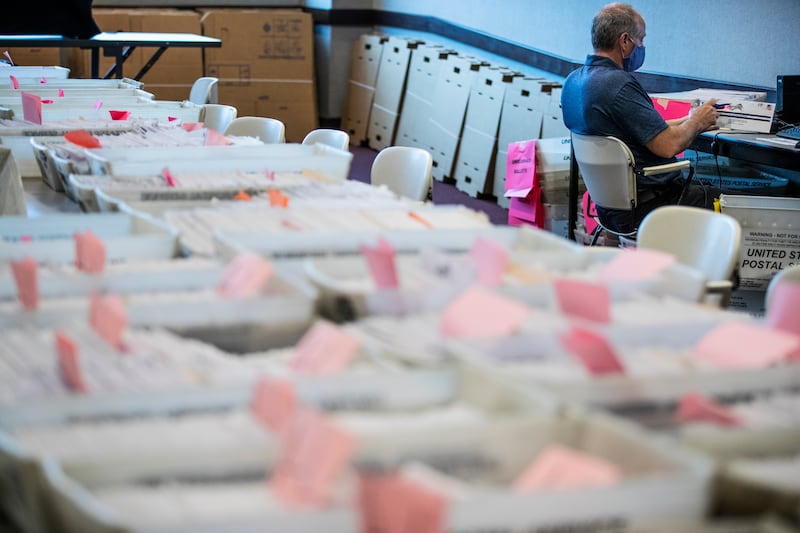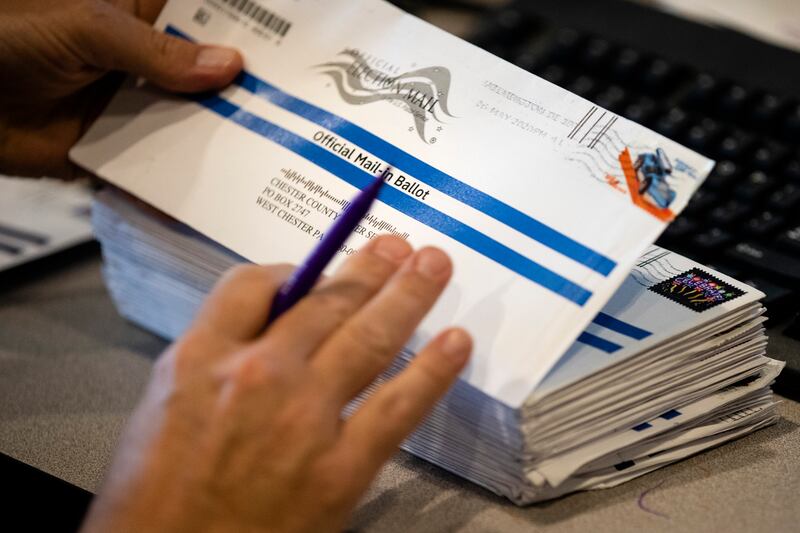SALT LAKE CITY — Even before COVID-19 complicated voting this year, Richard Hasen worried about the American public losing confidence in the elections. Mostly, he feared a “doomsday” scenario of public protest against a government voters don’t accept.
He and other experts watched with concern as mounting rhetoric about voter fraud, which Hasen says is overblown, and litigation over access to the polls portended the possibility of just that scenario.
“It’s extremely important, although we never think about it because implicit in a democracy is the idea that voters accept the results as legitimate and agree to fight another day,” says Hasen, a professor of law and political science at the University of California Irvine. “If you don’t have that, then you don’t have a democracy.”
To help shore up public confidence and ensure a “free and fair election,” Hasen — the author of “Election Meltdown,” which describes how America’s election system got to this point and what could be done about it — convened leaders in law, politics, media and technology to a conference in February to discuss their concerns. The result was a report recommending 14 steps for state election officials, media and leaders in government, technology and nonprofit sectors to take.
“The reasons for growing voter concern about the fairness and legitimacy of the U.S. election process are multifaceted, raising issues in law, media, politics and norms, and tech,” states the executive summary of the report titled “Free and Fair Elections During a Crisis.” “This means that solutions to bolster American confidence in the fairness and accuracy of the elections must be multifaceted as well.”
The April report emerged amid an effort by the Republican National Committee and President Donald Trump’s reelection campaign to enlist thousands of volunteers to monitor polling places for the possibility of fraud, resist efforts to expand vote by mail during the pandemic that they argue will favor Democrats and intervene in lawsuits filed by the Democratic Party to remove state barriers to voting.
Some observers and activists speculate the effort is meant to sow public doubt in the results, should Trump lose his bid for a second term, and give him a reason to disrupt what traditionally has been a peaceful transition of power.
Trump’s campaign dismisses such claims as baseless conspiracy theories, Politico reported.
Regardless, history has shown that faith in an election system is crucial to effective governing, and Hasen’s group hopes that implementing their recommendations can insure that will happen after November.
Struggle for public trust
Disputed elections were common in 19th-century America, when ballot manipulation, voter intimidation, suppression of minority voters and constantly changing state election rules were more the norm than the exception.
Federal elections to the House of Representatives were commonly appealed to Congress, which was tasked with declaring the winner. The House is also required under the Constitution to determine winners in presidential races if there is a tie or none of the candidates receives a majority of electoral votes, which happened in 1800 and 1824.
“I don’t think we can say there was this norm of acceptance that everybody just kind of slipped into without any struggle,” said Harvard historian Alexander Keyssar. “The requirements of a durable democracy require some legal process for challenging or appealing an election result, but I don’t think that came universally or easily.”
Public confidence was put to a severe test in 1876, when Democratic candidate Samuel Tilden won the popular vote over Republican Rutherford B. Hayes, but was just one vote shy of the electoral majority required to capture the presidency. Under the Constitution, presidential elections are decided by the Electoral College — a group of electors representing each state — not the popular vote.
But the electoral votes of Florida, Louisiana, South Carolina and Oregon were in dispute as local leaders of both parties acknowledged they engaged in ballot fraud, voter suppression and intimidation, according to historical accounts.
House and Senate leaders appointed a special commission of lawmakers and Supreme Court justices to resolve the electoral vote count. The 15-member panel voted along party lines, 8-7, to award the electoral votes to Hayes, who was declared president by one electoral vote three days before the inauguration.
The result never sat well publicly, however, as Hayes was commonly derided as “His Fraudulency” during his one-term in office, said Keyssar, author of “The Right to Vote: The Contested History of Democracy in the United States,” and a forthcoming book on the Electoral College system.
“I don’t think we can say there was this norm of acceptance that everybody just kind of slipped into without any struggle,” historian Alexander Keyssar said.
The contested 1876 election was also an indication of how a lack of public confidence in the final vote can influence how an administration will govern until the next election. Most historians generally agree Hayes won southern Democrats’ support in Congress by cutting a deal to pull government troops out of the south, effectively ending Reconstruction and allowing those states to legally impose segregation.
“Hayes could not intervene in the South to protect African Americans from oppression,” Keyssar said.
Sowing doubt
Only five times in U.S. history has a candidate won the popular vote but not the presidency, most recently Democrat Hillary Clinton in 2016. Such outcomes have always led to voter outrage and stress on the election system that surfaced after the election by supporters of the losing candidate.
But Trump has turned those historical norms on their head. After winning the electoral college and taking office, he became the first elected president to attribute losing the popular vote to unsubstantiated, widespread voter fraud, Hasen said.
Scholars, election observers and activists see claims of voter fraud by Trump and now the GOP as part of long-game strategy that he began in the 2016 election and is ramping up for 2020, before the vote takes place.
“What we are seeing from the Republican side in this election, and we saw strong roots of it in 2016, is an attempt to de-legitimize the process in the interest of being able to challenge the outcome afterwards,” Keyssar said. “I can’t think of a precedent for this.”
Trump began sowing seeds of doubt in election returns in 2016, urging supporters at campaign rallies to hang around polling places and observe any suspicious behavior that could help Democrats “steal” the election.
Shortly after his inauguration, Trump appointed a special commission to investigate election fraud, but it was dissolved nine months later without reporting any findings or recommendations.
Rhetoric about voter fraud resurfaced in 2018, with more unsubstantiated claims from both Republicans and Democrats who lost in the midterm election, Hasen wrote in “Election Meltdown.”
That same year, Hasen tallied what he believes is a record number of election-related lawsuits (394) filed by party officials and activists across the country on both ends of the political spectrum.
In March, GOP strategists and Trump campaign officials announced an “all hands on deck” initiative at a Conservative Political Action Committee meeting to enlist up to 50,000 volunteers to monitor polling places and challenge ballots and voters deemed suspicious in this year’s election.

“Just having a presence of some sort is a deterrent of probably 80% of the bad behavior that’s gonna happen,” GOP strategist Josh Helton told attendees. He didn’t specify what that behavior is, but he and other panelists offered a broad definition of fraud, ranging from intentionally destroying ballots and poll worker incompetence to mailing ballots to the wrong address and lawsuits seeking to loosen state restrictions on voter registration and mail-in voting.
In May, the Republican National Committee unveiled its Protect the Vote program, which has committed $20 million to fight lawsuits filed by the Democratic Party seeking improved access to voting. The GOP effort is also resisting the expansion of vote by mail as a safer alternative in light of COVID-19. Trump and the RNC say states rushing to implement vote by mail will open the door to voter fraud that will help Democrats.
Trump campaign spokeswoman Samantha Zager accused Democrats of using the pandemic to eliminate election safeguards.
“These efforts by Democrats to disrupt our elections undermine voter confidence more than anything,” she said in a statement. “Republicans are fighting back to ensure safeguards remain in place to protect the integrity of the vote for every American.”
While it’s questionable whether many states have the infrastructure to process high volumes of mailed ballots, it doesn’t help to have the president or party leaders inflame the public with false accusations of illegitimacy, said Norman Ornstein, a member of Hasen’s ad hoc committee and resident scholar with the American Enterprise Institute.
“We have real questions about the president’s fealty to a free and fair election,” he said. “When you have a president who says or who tweets that vote by mail is bad because Republicans can’t win elections with it, that tells you that this is not simply a concern about voter fraud, of which there is minuscule evidence, but about having more people vote.”
‘Doomsday’ scenario
But questioning the vote could also be a winning strategy.
Since 2017, far-right activists in the U.S. have tested political messaging in European elections. They determined that amplifying claims of election fraud, whether true or not, “could be an issue they could tap into ahead of the 2020 presidential election” to influence voters, according to a Politico review of online message board conversations among activists.
And a recent poll backed up that hunch. In April, when Trump alleged during his daily briefings that mail-in ballots invite voter fraud, pollster Scott Rasmussen found 62% believed mail-in voting would lead to increased voter fraud, if in-person voting was not allowed.
“Some public polls have shown an overwhelming preference for mail voting as opposed to the traditional approach of standing in long lines at crowded facilities” during a pandemic, Rasmussen, who also conducts polling for Deseret News, said to JusttheNews.com. “However, our poll ... showed that just as many are supportive of states establishing new in-person voting procedures that include appropriate social distancing protocols.”
Having a range of options that protect public health and ensure access to voting is among the recommendations made by the Ad Hoc Committee for 2020 Election Fairness and Legitimacy, which Hasen convened.
Others include helping news media outlets set realistic expectations for the timing of election results, which won’t necessarily be election night but days later, given an expected increase in absentee ballots.
The committee also recommended the election law community develop a nonpartisan set of protocols for how best to resolve vote counting disputes “that might render uncertain the outcome of the presidential election.”
Without immediate action to help election officials pull off an election during a pandemic and settle public anxiety over the results, Hasen fears the “doomsday” scenario of public unrest as swaths of the population don’t accept the election results.
“That sounds not like the advanced democracy of the United States, but more like the kinds of countries that have more recently enacted democratic reforms that are struggling to maintain democracy,” he said.


